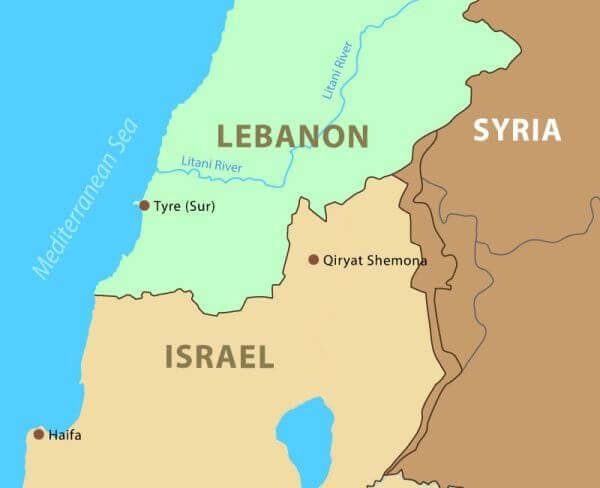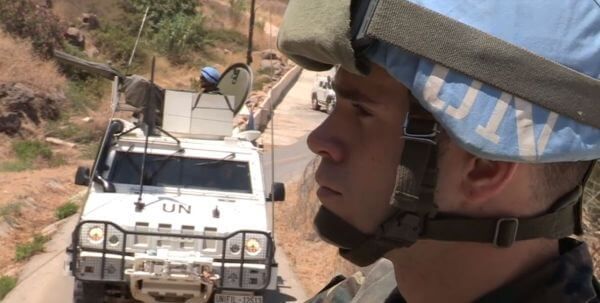Following the 2006 Israel-Lebanon war, the United Nations Security Council adopted Resolution 1701, at the time perceived as a strongly worded document. It was aimed at not just maintaining the ceasefire, but of strengthening the hands of the government in Beirut by endorsing and calling for the central government to assert control over the entire country.
However, for the most part 1701 has reflected the toothless inability of the international body to take those words and effectively implement them on the ground.
The 2006 war was not between two countries, but between Israel and the terrorist Hezbollah organization headed by Hassan Nasrallah that is funded, trained and armed by Iran. Hezbollah is not under the control of the Lebanese government, is not part of the Lebanese Armed Forces, and thus considers itself not obligated at all to the document. Its terrorist activities have been documented for years.
Join the fight for Israel’s fair coverage in the news
Resolution 1701: In Its Own Words
Two paragraphs in the UNSC resolution appeared to have been directly aimed at Hezbollah:
- “security arrangements to prevent the resumption of hostilities, including the establishment between the Blue Line and the Litani river of an area free of any armed personnel, assets and weapons other than those of the Government of Lebanon and of UNIFIL …”
- “full implementation of the relevant provisions of the Taif Accords, and of (UNSC) resolutions 1559 (2004) and 1680 (2006), that require the disarmament of all armed groups in Lebanon, so that, pursuant to the Lebanese cabinet decision of 27 July 2006, there will be no weapons or authority in Lebanon other than that of the Lebanese State.”
In short, 1701 calls for the disarming of Hezbollah and the deployment of the Lebanese army to exert sovereignty – especially in the south of the country along the Lebanon-Israel border. That area is monitored by UNIFIL, the United Nations Interim Force In Lebanon that is tasked with monitoring the area and whose heavy presence was intended to dissuade militias.

Resolution 1701: The Shortcomings
In practice the resolution proved to be toothless. At the time, experts at the respected Institute for National Security Studies (INSS) in Tel Aviv concluded that Resolution 1701 “provides no effective mechanism for action to disarm Hezbollah or terminate its existence as a state within a state.”
Analyst Aiman Mansour noted that Nasrallah was not affected by 1701, which created “a situation in which Lebanon after the campaign is little different from Lebanon before it … it does not create any framework that can threaten Hezbollah’s existence or ongoing terrorist activity.”
Thirteen years after resolution 1701 was passed, Hezbollah is not only armed, its weapons inventory has been greatly increased and it remains fully deployed south of the Litani River – as if the UNSC resolution never happened. Estimates put Hezbollah’s rocket and missile inventory at over 130,000 – enough to theoretically fire 1,000 rockets a day at Israel for over four months straight.
Iran's Covert Scheme to Upgrade Hezbollah's Rocket Arsenal Revealedhttps://t.co/C785TvrTkz pic.twitter.com/O6KiNGJRRi
— Haaretz.com (@haaretzcom) February 28, 2019
UNIFIL (the United Nations Interim Force In Lebanon) was created in 1978 ostensibly to help the Lebanese government assert sovereignty over the south of the country that had been controlled by armed militias. The UN forks out almost half a billion dollars annually to operate the peacekeeping force. As of August, 2019 it consisted of 10,277 peacekeepers from 44 troop-contributing countries, while Hezbollah is estimated to have 21,000 active fighters.
Related reading: All You Need to Know About the Hezbollah Threat to Israel
Powerless Peacekeepers
Since 2006, the Lebanese Armed Forces (LAF) has deployed units in the south, but military control of the area is firmly in Hezbollah’s grasp. Hezbollah operates under UNIFIL’s nose and it is the de facto force controlling the area along the entire length of the Lebanon-Israel border. Indeed, bright yellow Hezbollah flags dominate over the Lebanese national flag.
Aside from a number of cross-border missile and gunfire skirmishes, as well as the Hezbollah attack that sparked the 2006 war, the most blatant example of UNIFIL’s weakness was the numerous cross border attack tunnels dug by Hezbollah into Israeli territory. The goal of the tunnels, which were revealed in 2018, was to wreak havoc in Israel: capture and kill Israeli civilians and soldiers, yet somehow avoid an all-out war which would be catastrophic to Lebanon and damaging to Israel.
Although UNIFIL recognized that the tunnels were a “violation of the cease-fire agreement,” the UN peacekeepers were powerless to take any action.
“UNIFIL’s insistent requests to the Lebanese authorities to take immediate further action in this regard were left unanswered, and UNIFIL’s access to the site continues to be prevented by the Lebanese Armed Forces, despite repeated requests,” the Security Council said in a report afterwards.

The UN is generally known for its patience, with diplomats doing their jobs to negotiate, seek compromise and work towards consensus-oriented solutions. However, that patience sometimes wears thin, especially when the United States is involved.
At the annual renewal of UNIFIL’s mandate in 2019, the US delegation voted with the other UNSC members to keep UNIFIL going for another year, but noted that UNIFIL has been prevented from accessing Hezbollah’s tunnels. “Given that UNIFIL cannot fulfill a task within its mandate, it’s time to re-examine the Force’s troop strength and resource efficiency,” the Americans said.
Lebanese Frustration
Frustration with Resolution 1701 is also apparent with some parties inside Lebanon, whose fractious and fragile government coalition of Sunnis, Shiites, Christians and Druze has been unable to reign in Lebanese militias – most notably Hezbollah and Nasrallah – to fulfill the resolution’s mandate “that there will be no weapons without the consent of the Government of Lebanon and no authority other than that of the Government of Lebanon.”
“Resolution 1701 has not been respected since 2006 and is being violated on a daily basis, whether by Israel, through its air and sea breaches of Lebanese sovereignty, or by Hezbollah, and its claim that it is charged, alone, with the task of defending Lebanon,” said retired Lebanese Brig. Gen. Khaled Hamade, the former director the Strategic Research & Studies Centre of the Lebanese Armed Forces.
Since then, the Shiite terror organization has become so powerful, Lebanese Prime Minister Saad Hariri admitted that Lebanon can’t rein in Hezbollah and disavowed responsibility.
The dangers inherent in the failure to implement the provisions of UN Security Council Resolution 1701 are obvious. Hezbollah, a recognized terrorist organization continues to be armed and directed by Iran. There is no international pressure to force Hezbollah to drop its policy of being a state-within-a-state with its own large, dangerously-armed private army.
Despite its good sounding intentions, Resolution 1701 is an abject failure. Hezbollah has no incentive to change its central ideologies and policies, which mimic Iran’s repeatedly stated national goal for the “full annihilation of Israel.”
Liked this article? Follow HonestReporting on Twitter, Facebook, Instagram and TikTok to see even more posts and videos debunking news bias and smears, as well as other content explaining what’s really going on in Israel and the region.
New! Skip the social scroll and get the latest from HonestReporting via Telegram.
Featured image: vectors by Freepik; UNIFIL via YouTube/UNIFIL;
Before you comment on this article, please note our Comments Policy. Any comments deemed to be in breach of the policy will be removed at the editor’s discretion.

